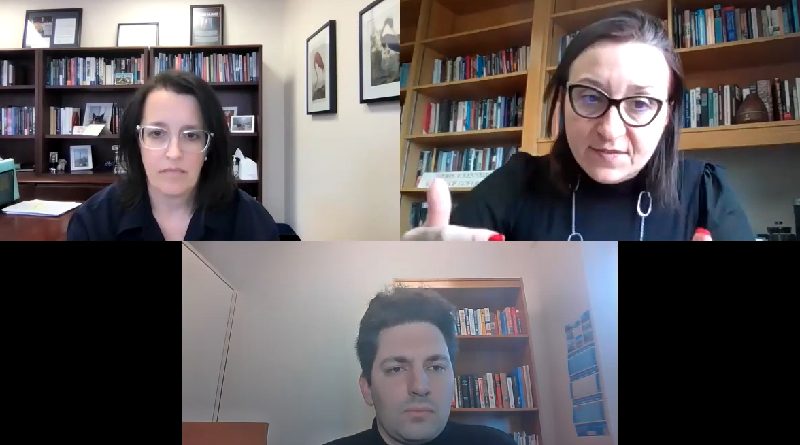Thinking the Unthinkable: Francesca Giovannini and Kelly Sims Gallagher Lead Fireside Chat with Fletcher Students Regarding Nuclear Weapons in Ukraine
By Alex Thomas, MALD 2023 Candidate, The Fletcher School
On Monday, March 7, 2022, Kelly Sims Gallagher and Francesca Giovannini joined the Fletcher community over Zoom to speak about the risk of nuclear weapon use in the war in Ukraine and beyond. Over the hour, the two spoke about multiple aspects of the conflict pertaining to nuclear weapon deployment, energy, and scenarios for peace.
The discussion began with a brief introduction of Professor Giovannini by Academic Dean Gallagher, then shifted into a Q&A format.
To begin, Dean Gallagher asked Professor Giovannini to share her observations of the conflict up until now. Professor Giovannini then spoke about the inception of the conflict and how Russia has used claims of Ukraine searching for nuclear weapons as one explanation to justify the invasion. While there has yet to be evidence supporting it, Putin claimed that Ukraine has sought nuclear weapons from NATO which would undermine Russia’s security.
Professor Giovannini then spoke briefly of the escalatory rhetoric of Putin regarding nuclear weapons and how the deliberate targeting of nuclear power plants in Ukraine (a clear violation of the Geneva convention) has led to a new narrative of nuclear terror as a tactic of war.
Dean Gallagher then asked Professor Giovannini to give a historical outline of nuclear weapons after the Cold War.
“Immediately after the breakdown of the USSR, Russia and The United States actually worked together to help denuclearize the former Soviet Republics, including Ukraine. Ukraine voluntarily gave up its nukes in exchange for specific safety guarantees, of which Russia has now violated.”
Professor Giovannini then highlighted the important role of the IAEA in the conflict, and how its responsibility has been to report on the status of the plants and report the data for analysis.
“The IAEA also never reported any diversion of Ukraine’s nuclear resources towards military programs,” she said. “Putin also refuses to follow the two explicit wishes of the IAEA: to create a safety corridor of 20 miles around the plant to protect the energy grid and water for cooling the plant, and to transmit data from the plant to the IAEA.”
She further explained how with the Russian army obfuscating the status of the plant and preventing IAEA inspectors from coming in, Putin is furthering the narrative that Ukraine was looking for nuclear weapons to strike Russia with.
The conversation then turned to Professor Giovannini’s predictions for the future and the likelihood of tactical nuclear weapons being deployed by Russia in Ukraine.
“Ultimately, it’s hard to believe that Putin will back down without a decisive victory in Ukraine, which could be Zelensky fleeing Ukraine and forming a government in exile. Until then, the more protracted the conflict becomes, the more likely Putin is at deploying nuclear weapons to turn the scales in his favor. I would put the probability at anywhere from 35-40 percent right now.”
The floor was then turned over for questions from the audience, of which Arik Burakovsky, Assistant Director of the Russia and Eurasia Program at Fletcher, was the moderator. Questions from the audience pertained to democracies versus authoritarian regimes, dissent within the Russian FSB, and the areas of cooperation between the West and China in the context of Russia.
Professor Giovannini closed the discussion with broader implications of the unfolding crisis concerning nuclear weapons.
“The fact that we are talking and thinking about the use of nuclear weapons in any situation is terrifying. We are already beyond any historical precedence. [Nuclear weapons] should simply be political weapons, never to be used in warfare.”
Francesca Giovannini is the Executive Director of Harvard Belfer’s initiative on Managing the Atom and an adjunct professor of international security at the Fletcher School. Kelly Sims Gallagher is the Academic Dean of the Fletcher School, professor of Energy and Environmental Policy, and the Co-director of the Climate Policy Lab within CIERP.

